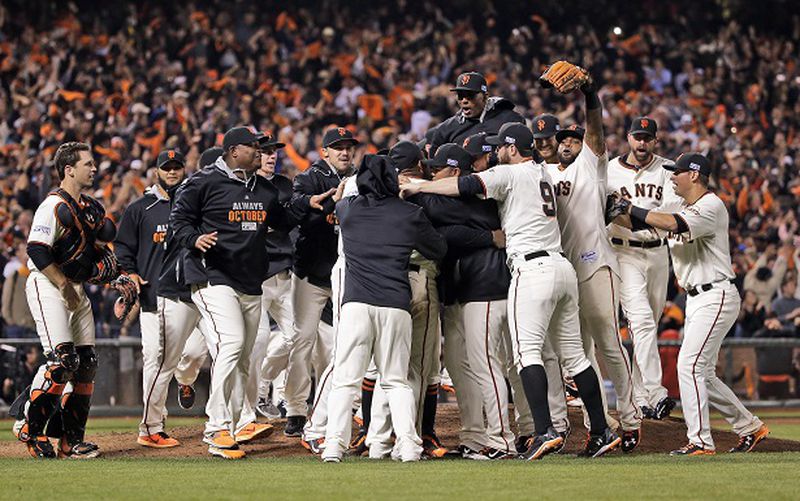Credit: Mark Bradley
Credit: Mark Bradley
Not to belabor a point, but over the past five seasons the Atlanta Braves have won 449 regular-season games. The San Francisco Giants have won 436; the St. Louis Cardinals have won 451. (From Opening Day 2010 through Sept. 18 of this year, the Braves and Cards had won the same number of games.)
Over that span, the Braves have won no playoff series -- we count the wild card play-in as a series -- and are 2-7 in postseason games. The Giants have won eight consecutive series and are 26-10 in postseason; the Cardinals have won eight of 10 series and are 30-22 in postseason. The Giants won the 2010 and 2012 World Series. The Cards won the 2011 World Series and lost to the Red Sox last season.
Either the Giants or the Cardinals will grace the 2014 Fall Classic. The Braves' season dissolved in a puddle of non-scoring and blame-levying. Today we ask, not for the first time : Why do the Giants and Cardinals rise in October, and what stops the Braves from doing the same?
We can round up the usual "explanations." Those teams Know How To Win Big Games. Those teams have "clutch" players and the Braves don't. Those teams have No. 1 starters and the Braves don't. (Although the best No. 1 starter in the business lost twice to the Cardinals.) Those teams have better managers. (Although the Cards have had two different managers in this run.) Those teams play with "emotion." (Although I'd note that the losing Nationals were rather emotional after Bryce Harper's tying home run last night.)
Going on the empirical, as opposed to the ephemeral, we return to some slender truths: The Cardinals and Giants do tend to put the ball in play more than the Braves -- meaning they strike out less -- and they do tend to hit better with runners in scoring position. (Here, though, we note that the Cardinals, who hit an unbelievable .330 with RISP last season, returned to reality this year, hitting only .258. Still, that was far better than the Braves, who hit .236, third-worst in baseball.)
We might also mention that the Cardinals, at least over the regular season, finished last in the National League in home runs, which might suggest that they're schooled in the art of Small Ball. (It might also suggest that they're not very good at hitting home runs.) But that wouldn't explain their victory over the Dodgers, in which 13 of their 18 runs came via the homer.
As we've again been reminded, much of what happens in October defies reason. According to Las Vegas, the four favorites to win the World Series entering October were the Nationals, the Dodgers, the Tigers and the Angels. All have been eliminated; none won even two games in its best-of-five Division Series. The roundly respected stats-based Baseball Prospectus picked the wrong winner in all four matchups. I've all but given up trying to project the postseason, but if pressed I'd have guessed the Dodgers and Tigers would meet in the World Series. Nope and nope.
I'll leave you with this: Even as we wonder why the Braves can't win in October, be advised that those who cover the teams that finished with the National League's two best records are asking the same question. The Washington Post suggested that the Nats lost because they lack the Giants' postseason grit and experience; the Los Angeles Times averred that the Dodgers just blew it.
[polldaddy poll=8360145]
About the Author







